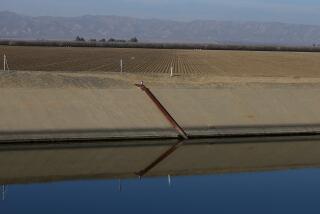Courts slow Trump’s agenda to open public lands to oil and gas drilling
Soon after President Trump took office, the rush to open millions of acres of federal land to oil and gas drilling was on.
Under pressure from the industry, the number of acres offered for lease shot up, the time it took to process a permit application dropped, and lease sales became more frequent. The administration’s actions were everything oil producers had hoped for from the president’s agenda for U.S. “energy dominance.”
In the last year, however, federal judges have applied the brakes.
Courts have ordered the government to suspend or void hundreds of leases, finding that the Interior Department’s Bureau of Land Management made procedural mistakes and violated environmental laws in its haste to increase domestic oil and gas production. Just weeks ago, a federal judge canceled more than $125 million in leases in Wyoming, Nevada and Utah.
Taken together, the rulings are another example — as with immigration, healthcare and the rollbacks of environmental regulations — of the check that courts are exerting on an unorthodox president eager to act quickly and often in defiance of established rules of governance.
In the oil and gas leasing cases, the judges’ decisions have interfered with the administration’s ability to deliver on its promises to industry and handed environmentalists a legal road map that advocates are using across the West.
Nearly a third of the oil and gas leases sold in 2017 and 2018 in the interior West have been suspended or canceled, according to data collected by the advocacy group WildEarth Guardians. Many sold in 2019 are now the subject of legal battles.
“These lawsuits are not stopping all of the bad ideas or execution of them, but they are really important in holding back some of the worst actions and starting to turn the tide,” said Nada Culver, vice president of public lands for the National Audubon Society.
The BLM did not respond to a request for comment from The Times. After this story was posted online, the agency provided a statement saying it was working within the law “to alleviate or eliminate unnecessary and burdensome regulations,” while also protecting the environment.
The administration has auctioned off more than 24 million acres of public lands, more acreage than the state of Indiana. Yet it has sold just a fraction of that — about 5 million acres — suggesting a glut that has outstripped demand.
Under the Obama administration, the BLM often delayed or canceled lease sales likely to face overwhelming opposition for proposing to drill near national parks and prized wilderness areas.
Under Trump, little if any land is off limits. The race to boost drilling also could have an effect long after he leaves office: Leases give companies drilling rights for 10 years, but they can be extended indefinitely if the wells produce.
As the administration’s drilling push has become one of its most controversial initiatives, more disputes have gone to court instead of being resolved administratively.
The industry blames environmental groups’ unyielding opposition and litigiousness; environmentalists counter that the court rulings validate their argument that the administration views scientific analysis and public comment as a burden, rather than a legal requirement.
“It’s almost like this boomerang effect,” said Kyle Tisdel, an attorney for the Western Environmental Law Center, an advocacy group headquartered in Oregon. “The more the agency tries to fast-track these decisions and curtail the type of analysis being done, the more we’re seeing decisions where the courts are moving in the other direction.”
Environmental groups have pursued two legal strategies. One accuses the administration of fast-tracking leasing by making it more difficult for the public to weigh in on the agency’s decisions. Another argues the government has failed to take into account the climate change impacts of widespread oil and gas drilling.
Both approaches have paid off.
In the case in late February that canceled more than $125 million in oil and gas leases issued in 2018, U.S. Magistrate Judge Ronald Bush said that the BLM had illegally curtailed public participation by reducing the period during which people could protest lease sales from 30 days to 10.
The ruling stunned the industry and oil-producing states, which had argued that voiding the leases would require the government to issue refunds and deprive the states of their half of the revenue.
Ryan McConnaughey, a spokesman for the Petroleum Assn. of Wyoming, said that if the ruling stands, it would void 450 leases in the state, damaging an industry already facing shrinking profits. Even before the coronavirus pandemic sent the oil markets into a frenzy, the number of rigs drilling new wells had dropped from 33 to 23 in the last year, he said, “resulting in hundreds of lost jobs from the Wyoming economy.”
Kathleen Sgamma, president of the Western Energy Alliance, a Denver-based association of independent oil and gas companies, said that while she was confident the judge’s ruling would be reversed on appeal, it had made producers anxious about bidding on public lands.
“You do have companies that are very concerned,” she said, adding that some producers whose leases were canceled had already drilled wells and begun to extract oil and gas. “It sows an incredible amount of uncertainty into those leases and, frankly, into the entire leasing system.”
The decision covered nearly a million acres of public lands that are home to the sage grouse, a bird whose numbers are in decline, but environmental groups said its significance is much broader. The precedent could be used to challenge all leases sold in 2018 under the same policy.
In March 2019, a federal judge in Washington suspended leases on 300,000 acres of public lands in another Wyoming case. District Judge Rudolph Contreras found that the BLM had violated federal law by failing to fully analyze how oil drilling could exacerbate climate change.
Although that ruling affected leases sold during the Obama administration, its impact did not stop there. Because BLM relied on a similarly incomplete climate change analysis in multiple lease auctions, environmental groups have used Contreras’ decision to challenge Trump’s actions across the West.
Landon Newell, an attorney for the Southern Utah Wilderness Alliance, said the conservation group’s lawsuits and administrative challenges have led the federal government to suspend more than 230 leases across 300,000 acres in his state.
The bureau has since issued a better analysis of how drilling on the leased land could drive up greenhouse gas emissions, Newell said. Yet the agency has created a new set of problems for itself, he added, by narrowing or eliminating its study of the environmental impact of oil and gas leasing on water quality and endangered species.
The BLM “is making itself very ripe for challenge based on its failure to analyze impacts to a broader range of resources,” Newell said. “They have only set themselves up for another mess down the road.”
More to Read
Get the L.A. Times Politics newsletter
Deeply reported insights into legislation, politics and policy from Sacramento, Washington and beyond. In your inbox three times per week.
You may occasionally receive promotional content from the Los Angeles Times.







